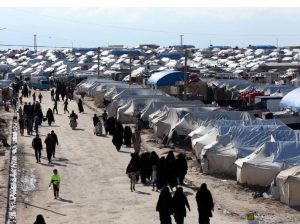Returned ISIS kids reintegrating well – study
The children of ISIS fighters freed from squalid detention camps are thriving, successfully reintegrating and building new lives in their home countries, a new study has found.
The study, by NGO Human Rights Watch, comes as controversy rages in Australia over the federal government’s program to repatriate the children and wives of former ISIS fighters, who have been trapped in camps in northern Syria.
In October, Australia brought back four women and 13 children, its first repatriations since 2019.
The report, titled ‘My Son is Just Another Kid: Experiences of Children Repatriated from Camps for ISIS Suspects and Their Families in Northeast Syria’, documents the stories of about 100 children rescued from dire conditions in in Syrian camps and brought home in recent years to France, Germany, Kazakhstan, the Netherlands, Sweden, the United Kingdom, and Uzbekistan.
The report documents the stories of about 100 children rescued from dire conditions in in Syrian camps and brought home in recent years to France, Germany, Kazakhstan, the Netherlands, Sweden, the United Kingdom, and Uzbekistan.
“They’ve gone from situations where they had almost nothing – insufficient water, no fresh food, no health care, and little or no access to education – to normal lives, playing football, skating, cycling, and dancing,” the report said
The study found the children were adjusting positively, making new friends, and performing well in school.
HRW surveyed 81 family members, foster parents, social workers, and teachers, and interviewed family members, lawyers, legal guardians, and mental health professionals about returned or repatriated children.
When asked how the child is adjusting, 89 percent of survey respondents reported that the child was doing “very well” or “quite well.” Seventy-three percent said the child was performing “very well” or “quite well” in school.
There are still around 56,000 people – almost all the wives and children of male ISIS suspects – detailed in the al-Hol and Roj camps in north east Syria.
More than 18,000 are from Syria, about 28,000 from neighbouring Iraq, and more than 10,000 are from about 60 other countries. Sixty per cent of them are children.
 Nearly 80 percent of the children in the camps are under age 12, and 30 percent are age 5 or younger. Many have spent the majority, if not all, of their lives unlawfully detained for what amounts to punishment for war crimes.
Nearly 80 percent of the children in the camps are under age 12, and 30 percent are age 5 or younger. Many have spent the majority, if not all, of their lives unlawfully detained for what amounts to punishment for war crimes.
Most were detained in 2019, when regional fighters backed by a US-led military coalition toppled the last remnant of the self-declared ISIS “caliphate” in northeast Syria.
HRW says the detention is unlawful as none of the detainees have been brought before a court to determine the necessity of their detention.
“Children rescued from the horrors of the camps are doing well in school, making friends, and building new lives in their home countries. Despite enduring unimaginable suffering, many are reintegrating remarkably well,” said HRW children’s advocate Jo Becker.
HRW reports that the regional authorities, the Kurdish-led Autonomous Administration of North and East Syria, have said they lack the resources to detain the foreigners and have appealed to countries to repatriate their nationals – as has the United Nations.
But many countries, including Australia until recently, have refused to take any or all of them back.
The report says policy choices by some repatriating governments has made it more difficult for children to reintegrate, and in some cases, even caused additional harm.
“In some countries – including Belgium, France, the Netherlands, and Sweden – authorities have immediately separated children from their mothers if the mother is being investigated or charged with ISIS-related offenses. That has caused children significant emotional and psychological distress,” the report said.
“In other countries, extended family members, such as grandparents, face lengthy investigations before they are allowed to care for returned children,” it said.
The report found that some children exhibit emotional or behavioural issues related to trauma they experienced while living under ISIS or in the detention camps, or struggle to catch up in school.
But it said that learning assistance and psychosocial support can facilitate their successful reintegration.
Since 2019, approximately three dozen countries have repatriated or otherwise helped bring home some or many of their detainees.
Denmark, Finland, Germany, Kazakhstan, Kyrgyzstan, Russia, Sweden, Tajikistan, the US, and Uzbekistan have repatriated many or most of their nationals.
Read the full report: “My Son is Just Another Kid”: Experiences of Children Repatriated from Camps for ISIS Suspects and Their Families in Northeast Syria | HRW












